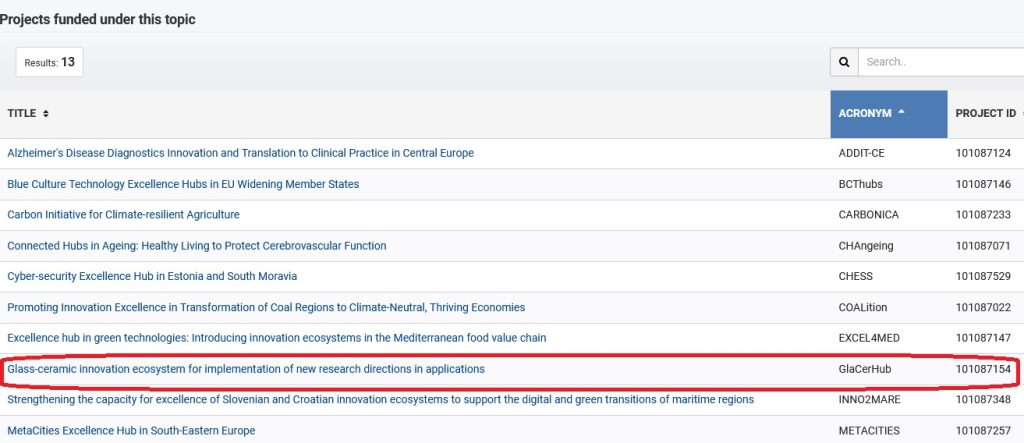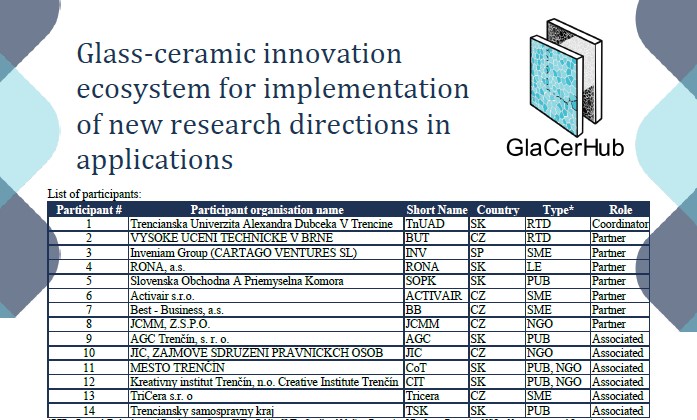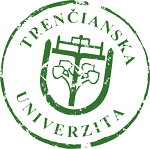FunGlass has started the implementation of a new project of the Horizon Europe
 Today, our Center is launching the implementation of a new project called Glass-ceramic innovation ecosystem for implementation of new research directions in applications. We will know it under acronym “GlacerHub”. For our center, this is the second important project from European funding system for research and development, in which we will work as coordinators (the first one is the FunGlass project).
Today, our Center is launching the implementation of a new project called Glass-ceramic innovation ecosystem for implementation of new research directions in applications. We will know it under acronym “GlacerHub”. For our center, this is the second important project from European funding system for research and development, in which we will work as coordinators (the first one is the FunGlass project).
FunGlass Centre, in cooperation with twelve other partners, has the ambition to create a networking environment supporting innovation and the transfer of technologies from research to industrial practice in the Slovak-Czech border region, especially in the field of glass and ceramics. The interaction and alignment of four broad groups of key stakeholders – science, industry, regional government and social organizations (the so-called quadruple helix), settled in Trenčín and South Moravian regions, can deliver dynamic and positive change that meets the needs of all the stakeholders.
The GlaCerHub consortium is made up of 6 partners from the Czech Republic and 7 from the Slovak Republic. They are supported by international tech transfer best practices from Spain and Israel through the INVENIAM company. Partners complement each other by providing their research capabilities and facilities (FunGlass, and the Technical University in Brno, CEITEC), the industrial view of the sector needs (RONA, a. s., Activair, s. r. o., Best Business, a. s., Tricera, s. r. o. and AGC Trenčín), government support (City of Trenčín, Trenčín Self-governing region, and the third sector involvement on dissemination, formation, and talent attraction (Slovak Chamber of Commerce, Creative Institute Trenčín, n. o., JCMM, Z.S.P.O. – South Moravian Centre for International Mobility, JIC company).
Specifically, GlaCerHub wants to focus on the intensive creation of innovation-oriented networks, the creation of a joint research and innovation strategy of involved institutions, organization of trainings for future innovators and activities supporting technology transfer. The scientific institutions, together with industrial partners, will deal with spectrum of topics in the field of development of new functional and surface functionalized glass and ceramic materials that should bring benefits not only to our regional society, especially in
- Automotive: protective and corrosion resistant coatings, hard and wear resistant coatings improving mechanical performance and decreasing the wear of engineering parts, lightweight fillers in polymer parts,
- Aerospace: thermal barrier coatings enhancing the efficiency of airplane engines, eutectic composites for high temperature applications, corrosion resistant coatings for Al & Mg-based alloys
- Healthy environment (green technologies /waste management): water and air purification systems (ceramic and glass microfilters), recycling of scrap glass fibres, up-cycling of non-recycable glass and ceramics
- Smart and energy efficient construction: glass coatings for smart building envelopes and facades, low-energy fabrication of building materials (geopolymer-like materials)
- Health (healthy society/advanced medicine): implants and composites for tissue replacement and regeneration, ceramic/metallic scaffolds for orthopeadics, glass microspheres for radiotherapy, glass/biopolymer fibre composites for wound dressing
- Sustainable energy: thermal barrier coatings for turbines in energy sector, coatings for solar energy harvesting, energy efficient manufacturing processes
GlaCerHub is among 13 successful projects from the Excellence Hubs call (HORIZON-WIDERA-2022-ACCESS-04), in which a total of 102 consortia participated. The project implementation with financial support of €4,994,751.25 (of which TNUAD €2,231,925.00) is planned for 48 months, from June 1, 2023 to May 31, 2027.
We are looking forward facing new challenges!














